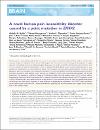A novel human pain insensitivity disorder caused by a point mutation in ZFHX2
| المؤلف | Habib A.M. |
| المؤلف | Matsuyama A. |
| المؤلف | Okorokov A.L. |
| المؤلف | Santana-Varela S. |
| المؤلف | Bras J.T. |
| المؤلف | Aloisi A.M. |
| المؤلف | Emery E.C. |
| المؤلف | Bogdanov Y.D. |
| المؤلف | Follenfant M. |
| المؤلف | Gossage S.J. |
| المؤلف | Gras M. |
| المؤلف | Humphrey J. |
| المؤلف | Kolesnikov A. |
| المؤلف | Le Cann K. |
| المؤلف | Li S. |
| المؤلف | Minett M.S. |
| المؤلف | Pereira V. |
| المؤلف | Ponsolles C. |
| المؤلف | Sikandar S. |
| المؤلف | Torres J.M. |
| المؤلف | Yamaoka K. |
| المؤلف | Zhao J. |
| المؤلف | Komine Y. |
| المؤلف | Yamamori T. |
| المؤلف | Maniatis N. |
| المؤلف | Panov K.I. |
| المؤلف | Houlden H. |
| المؤلف | Ramirez J.D. |
| المؤلف | Bennett D.L.H. |
| المؤلف | Marsili L. |
| المؤلف | Bachiocco V. |
| المؤلف | Wood J.N. |
| المؤلف | Cox J.J. |
| تاريخ الإتاحة | 2020-02-05T08:53:35Z |
| تاريخ النشر | 2018 |
| اسم المنشور | Brain |
| المصدر | Scopus |
| الرقم المعياري الدولي للكتاب | 68950 |
| الملخص | Chronic pain is a major global public health issue causing a severe impact on both the quality of life for sufferers and the wider economy. Despite the significant clinical burden, little progress has been made in terms of therapeutic development. A unique approach to identifying new human-validated analgesic drug targets is to study rare families with inherited pain insensitivity. Here we have analysed an otherwise normal family where six affected individuals display a pain insensitive phenotype that is characterized by hyposensitivity to noxious heat and painless bone fractures. This autosomal dominant disorder is found in three generations and is not associated with a peripheral neuropathy. A novel point mutation in ZFHX2, encoding a putative transcription factor expressed in small diameter sensory neurons, was identified by whole exome sequencing that segregates with the pain insensitivity. The mutation is predicted to change an evolutionarily highly conserved arginine residue 1913 to a lysine within a homeodomain. Bacterial artificial chromosome (BAC) transgenic mice bearing the orthologous murine p.R1907K mutation, as well as Zfhx2 null mutant mice, have significant deficits in pain sensitivity. Gene expression analyses in dorsal root ganglia from mutant and wild-Type mice show altered expression of genes implicated in peripheral pain mechanisms. The ZFHX2 variant and downstream regulated genes associated with a human pain-insensitive phenotype are therefore potential novel targets for the development of new analgesic drugs. awx326media1 5680039660001 The Author (2017). Published by Oxford University Press on behalf of the Guarantors of Brain. |
| راعي المشروع | We thank the Medical Research Council (J.J.C., Career Development Award, G1100340), Wellcome Trust (200183/ Z/15/Z and 101054/Z/13/Z) and Arthritis Research UK (20200) for generous support and Shionogi for an academic research grant (165302). Thanks to the University of Siena for partially funding this research. J.T.B. is supported by a Research Fellowship from the Alzheimer�s Society. J.D.R. received funding from the Wellcome Trust through the London Pain Consortium and from Colciencias through a Francisco Jose de Caldas Scholarship (LASPAU, Harvard University). D.L.H.B. is a Wellcome senior clinical scientist (ref. no. 095698z/11/z and 202747/Z/16/Z) and member of the Wellcome Pain Consortium. |
| اللغة | en |
| الناشر | Oxford University Press |
| الموضوع | dorsal root ganglia Mendelian pain insensitivity transcription factor |
| النوع | Article |
| الصفحات | 365-376 |
| رقم العدد | 2 |
| رقم المجلد | 141 |
الملفات في هذه التسجيلة
هذه التسجيلة تظهر في المجموعات التالية
-
أبحاث الطب [1673 items ]


